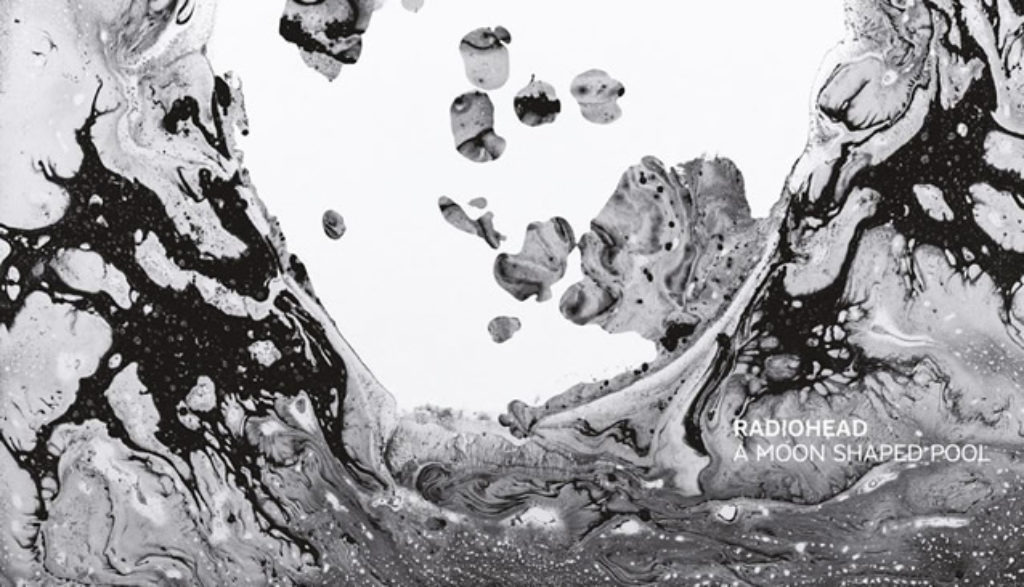
If rock critics were asked to name the most influential band of the last thirty years or so, I suspect Radiohead would come out on top. And that would be a curious result in some ways, given that the band’s highest-charting single ever in the U.S., 1992’s “Creep,” only managed to make it to No. 34.
No matter. The arrival of a new Radiohead album never fails to elicit rapturous praise from the alt-rock cogniscenti—never mind that the band’s signature mix of ethereal soundscapes and impenetrable lyrics are never hook-laden earworms.
And so it is again with the British band’s ninth album, Radiohead’s first new material in (coincidentally) nine years. Dreamy, aching, melancholy sounds are fused once more to dreamy, aching, melancholy lyrics, prompting critics such as Rolling Stone’s Andy Beta to swoon. He calls A Moon Shaped Pool a “haunting, stunning triumph,” the band’s most “gorgeous and desolate album to date.”
Perhaps it is.
Album opener “Burn the Witch” is indicative of the lyrical challenge faced by anyone trying to parse the meaning of a Radiohead song. Is it positive or negative that the band is warning against groupthink hysteria? “Stay in the shadows,” we’re warned. “Abandon all reason/Avoid all eye contact/Do not react/ … Burn the witch/We know where you live.” Radiohead has often focused on these sorts of paranoid themes throughout its career. And depending upon one’s perspective on the world, such suspicion likely either seems totally justified or nervously overwrought.
Similarly, the phrase “I’ve found my love” is repeated—backwards—a number of times in “Daydreaming.” Does the fact that it’s played in reverse negate the positive message here? Again, it probably depends upon your perspective. Likewise, in the same song, is a “white room/By window/Where the sun goes through” a happy, perhaps even transcendent place … or a sterile, clinical place of imprisonment? (The latter interpretation might be more likely given the grim lyrics elsewhere in the track.)
“Desert Island Disk” perhaps talks of transcendence (or maybe heaven?) when Yorke sings of crossing over to a brighter place (“Totally alive/And my spirit light/Through an open doorway/Across a stream/To another life/ … Waking up, waking up from shutdown/From a thousand years of sleep”). The song concludes with yet another “Is that positive or problematic?” phrase: “Different types of love/Are possible.”
“Ful Stop” repeatedly insists, “Truth will mess you up.” Is that bad or good? Possibly either, depending on how you parse what the band is singing about here. There’s only the barest contextual hint for resolving this question when Yorke sings, “When you take me back/Take me back again/You really/Really me/You really messed up.” At the very least, he’s apparently hinting at a tough relationship, one in which telling the truth is difficult.
“The Numbers” admonishes individuals to take personal responsibility to positively impact the environment (“We are of the earth/To her we do return/The future is inside us/It’s not somewhere else/ … We call upon the people/People have the power/ … The river running dry”).
“Daydreaming” suggests that “dreamers” don’t cope well with the harsh realities of life. “Dreamers,” Yorke begins wearily, “They never learn/ … And it’s too late/The damage is done.”
An ominous alien invasion (whether literal or metaphorical isn’t spelled out) is the focal point of “Decks Dark”: “And in your life, there comes the darkness/There’s a spacecraft blocking out the sky/And there’s nowhere to hide/You run to the back and cover your ears.” And romantic desperation lurks in “Glass Eyes”: “Panic is coming on strong/ … I feel this love turn cold.” Meanwhile, there’s straight-up denial at the heart of “Identikit,” where we hear repetitions of the phrases, “And now I see you messing me around/I don’t want to know,” and, “Broken hearts make it rain.”
Yorke is determined to give his heart to a love that he knows is doomed on “Present Tense” (“It’s no one’s business but mine/That all this love/Could be in vain”).
“True Love Waits” (almost certainly an ironic, sarcastic stab at the well-known abstinence movement) finds Yorke apparently singing from the perspective of a woman who would compromise her convictions to keep a man (“I’ll drown my beliefs/To have your babies/I’ll dress like your niece/And wash your swollen feet”) whom she begs not to abandon her (“Just don’t leave”). Elsewhere, the song says cryptically (but apparently critically), “And true love waits/In haunted attics/And true love lives/On lollipops and crisps.”
There’s no doubt that Radiohead vocalist Thom Yorke’s fragile falsetto is an emotive, compelling instrument of artistic expression. The same can be said of his band’s swirling, swooshing, somber electro-rock accompaniment.
Yet despite the truckloads of critical praise his band has collected over the decades, it often remains difficult to pin down exactly what Yorke and Co. are singing about in those somber, compelling songs. Moments of hopeful transcendence exist here. But they’re few and far between. Most of the time, what we get instead are fleeting glimpses of loss, paired with paranoia, damage and dread.
Now that I think about it, maybe Radiohead’s lyrics aren’t so hard to pin down after all.


After serving as an associate editor at NavPress’ Discipleship Journal and consulting editor for Current Thoughts and Trends, Adam now oversees the editing and publishing of Plugged In’s reviews as the site’s director. He and his wife, Jennifer, have three children. In their free time, the Holzes enjoy playing games, a variety of musical instruments, swimming and … watching movies.